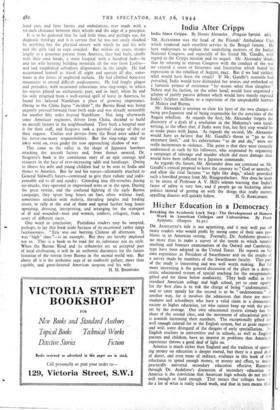India After Cripps
India Since Cripps. By Horace Alexander. (Penguin Special. 9d.)
- MR. ALEXANDER was the head of the Friends' Ambulance Unit, which rendered such excellent service in the Bengal famine. He'
here endeavours to explain the underlying motives of the Indian, National Congress, and especially of his friend Mr. Gandhi, with' regard to the Cripps mission and its sequel. Mr. Alexander thinks, that by refusing to entrust Congress with the conduct of the war' we created a sense of bitterness and frustration which found its'.
expression in the rebellion of August, 1942. But if we had yielded: what' would have been the result? If Mr. Gandhi's counsels had prevailed, India would have disbanded her armies and embarked on a fantastic project of resistance " by means other than slaughter.", Nehru and his faction, on the other hand, would have organised 3' scheme of purely passive defence which would have merely exposed India's helpless millions to a repetition of the unspeakable horrors of Malaya and Burma.
Mr. Alexander is anxious to clear his hero of the 'two charges of being pro-Japanese and of being responsible for the atrocities of the. August rebellion. As regards the first, Mr. Alexander forgets the discovery of a draft of a resolution in the Mahatma's own hand-' writing, to the effect that, if India were free, her first step would be to make peace with Japan. As regards the second, Mr. Alexander would have us believe that Mr. Gandhi's threat to " go to the extremest limit," and his exhortations " to do and die," were not really incitements to violence. The point is that they were certainly understocd as such by his followers, who responded by organising a campaign of sabotage and murder which did more damage than would have been inflicted by a Japanese commando.
As regards the future, Mr. Alexander does not comment on Mr. Gandhi's cynical proposal to leave the country to "God or anarchy," and allow the rival factions " to fight like dogs," which provoked such a horrified protest from Mr. Rajagopalachari. Nor does he seem tc be aware of Professor A. V. Hill's solemn warning that India's factor of safety is very low, and if people go on bickering about politics instead of getting on with the things that really matter, appalling disaster will quickly follow. H. G. RAWLINSON.


























 Previous page
Previous page